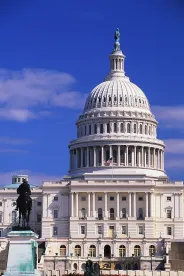While the focus over the past 16 days has been on the shuttered government and the prospect of the United States defaulting on its debt obligations, there are subtexts that are relevant to the health care industry. This On the Subject details five key health care takeaways.
On the 16th day of the government shutdown and the eve of the federal government potentially defaulting on its loans, lawmakers on October 16, 2013, reached a bipartisan agreement to reopen the federal government and raise the debt ceiling. After more than two weeks of very little movement, a deal was finally brokered largely by Senate Majority Leader Harry Reid (D-NV) and Senate Minority Leader Mitch McConnell (R-KY).
The plan would enact a continuing resolution that would reinstate government funding at pre-shutdown levels through January 15, 2014, and would raise the debt ceiling through February 7, 2014. In addition, lawmakers agreed to begin conference negotiations on the fiscal year (FY) 2014 budget and instruct conferees to reach an agreement by December 13, 2013, in order to provide a path forward in advance of the continuing resolution’s mid-January 2014 expiration date.
Regarding the Affordable Care Act (ACA), the agreement would make only a minor adjustment to the law, requiring more stringent steps in verifying the income levels of those who apply for federal subsidies to purchase health insurance. Despite strong efforts from stakeholders and considerable congressional support, the bill does not provide relief on the medical device tax.
The agreement—H.R. 2775, as amended—was brought directly to the Senate floor on October 16, 2013, where it was approved by a bipartisan vote of 81–18. The House then took up H.R. 2775 and approved it by a vote of 285–144, despite resistance from the conservative faction of the Republican majority, 144 of whom opposed the bill. President Obama signed the bill into law shortly after midnight on October 17. The full text of the measure can be found here, and a summary can be found here.
The FY 2014 budget conference was set in motion when the Senate passed a separate unanimous consent agreement on October 16. The conference committee will be led by Senate Budget Chairwoman Patty Murray (D-WA) and House Budget Chairman Paul Ryan (R-WI). Other conferees include Senate Budget Committee Ranking Member Jeff Sessions (R-AL), House Budget Committee Ranking Member Chris Van Hollen (D-MD), and other members of both the Senate and House Budget Committees. The conferees are tasked with setting government spending levels for the remainder of the fiscal year, and with seeking to formulate a long-term plan for tax, spending and entitlement policies that will achieve significant deficit reduction, all by December 13, 2013—although there is no formal enforcement mechanism attached to this deadline.
While the focus over the past 16 days has been on the shuttered government and the prospect of the United States defaulting on its debt obligations, there are subtexts that are relevant to the health care industry. These five key health care takeaways are as follows.
1. No Medicare Legislation in 2013
The new strike points established by the bill (January 15, 2014, for government funding and February 7, 2014, for the debt ceiling) likely mean there will be no Medicare legislation in 2013. Although steep cuts to Medicare payments for physician services will occur on January 1, 2014, in the absence of legislative intervention, that threat likely will not be enough to induce Congress to act independently on Medicare physician payment reform, other than perhaps to provide a short-term (e.g., two- or three-week) patch to carry physician payments at 2013 levels into the first few weeks of 2014.
As previously reported, legislative efforts have been underway to repeal the Sustainable Growth Rate (SGR) formula currently used to calculate Medicare physician reimbursement and phase in a new payment system based on quality of care and efficiency. Despite the increased momentum that Medicare physician payment reform efforts have seen in 2013, the timing of the continuing resolution and debt ceiling agreement largely diminishes chances for comprehensive reform before the end of the year. This is because entitlement program reforms—including both Medicare and Medicaid—will undoubtedly play a large role in the conference committee deliberations, and it is highly unlikely that Congress would try to separately address the flawed SGR and other expiring Medicare programs through a separate, earlier process. While this is certainly discouraging news for those who would be adversely affected by decreasing physician payments and those who had hoped for earlier action on various other expiring Medicare payment provisions, it does provide some additional time to those sectors that expected to contribute heavily in any bill requiring Medicare offsets.
2. The Grand Bargain Is Back on the Table
The conference committee process established by the bill means that large-scale deficit reduction is back on the table and that a grand bargain will be the goal. Under a major deficit reduction effort scenario, Congress could look to squeeze $400 billion to $600 billion from the Medicare program, and $150 billion to $200 billion from Medicaid. Should this occur, Congress will have to go deep into the list of offsetting “pay fors” that have been floated in recent years, and all segments of the health care industry will be vulnerable.
3. Sequestration May Be Revised
A similar fiscal crisis in 2011 resulted in the Budget Control Act, which set up a panel to develop deficit reduction recommendations. When that panel failed, it led to sequestration, including a 2 percent across-the-board cut to Medicare spending. The extension of government spending to January 15, 2014, is not an arbitrary date, as that date is when the next round of sequestration cuts is set to be implemented. Both Republicans and Democrats want to reopen the sequestration mandate, and lining up this process with the next sequestration implementation date creates that opportunity.
4. The ACA Remains the Law of the Land
While changing politics can change legislative dynamics, if opponents of the ACA were not able to force large-scale change to the ACA in this debate, it seems unlikely that they will be able to ever do so under the current composition of Congress. While this may not prevent a faction of the Republican party from trying, and from forcing minor changes along the way, it is not likely that major changes will come from these assaults.
The future likely will see continued bipartisan legislative efforts to repeal the ACA’s medical device tax and to change the ACA’s definition of full-time employee from the law’s 30-hour-a-week definition to a higher number, such as 35 or 40 hours. All in all, however, the ACA once again remains intact. Ironically, ACA opponents’ efforts to de-fund the health reform law, which led to the 16-day government shutdown and debt ceiling brinksmanship, effectively deflected attention from the problem-plagued rollout of the ACA’s online insurance marketplaces, which went live on October 1, 2013.
5. Rulemakings Will Be Affected
The Centers for Medicare and Medicaid Services (CMS) has been largely shuttered for 16 days. Key Medicare payment rulemakings, such as the Hospital Outpatient Prospective Payment System and Medicare Physician Fee Schedule updates, were expected to be posted by November 1, 2013. It now seems unlikely that CMS will be able to meet those goals, although how far the agency goes past the deadlines remains to be seen. Also unclear is whether the compressed time frame affects the substance of those rulemakings, as CMS may be less able to consider comments in the rush to completion. Whether that results in CMS postponing implementation of the more controversial aspects until 2014 or pressing ahead with less thoughtful consideration is also unclear at this point.






 />i
/>i

